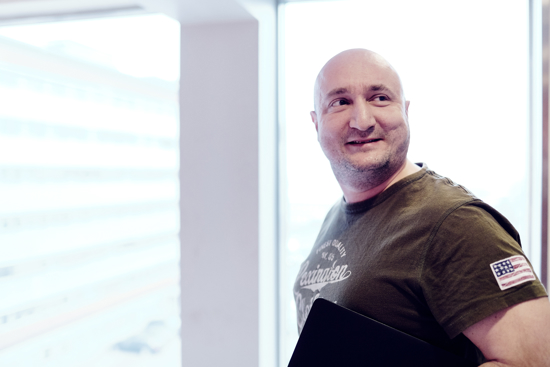Posted workers outside the EU/EEA
You are considered a posted worker when you work temporarily abroad for your employer in Norway and receive your wages from this employer.

Illustration: Morten Rakke / Helfo
Membership of the Norwegian National Insurance Scheme
You are considered a posted worker when you work temporarily abroad for your employer in Norway and receive your wages from this employer.
This presupposes that your employer pays employer's National Insurance contributions to Norway. You retain your mandatory membership of the Norwegian National Insurance Scheme during your temporary period of work abroad and will be entitled to reimbursement for medical expenses from Norway. Read more about working abroad at the website of the Norwegian Labour and Welfare Administration (NAV).
Dependent spouses and children or dependent cohabitants and shared children will have the same health care entitlements as yourself in the country in which you are working.
Your rights to health care services abroad depend on your membership of the Norwegian National Insurance Scheme. NAV Social Insurance and Contributions determines whether you have the right to membership of the Norwegian National Insurance Scheme when you are working outside of Norway.
Example
Cecilie works for the Ministry of Foreign Affairs. She is posted to the Norwegian Embassy in Dar es Salaam in Tanzania. She is therefore entitled to reimbursement for healthcare expenses from Norway for treatment she receives in Tanzania.
If you become sick
Your employer can pay for the treatment if you become sick.
If you require health care services during your period of work, your employer can pay for the treatment and then afterwards apply to Helfo (Norwegian Health Economics Administration) for reimbursement. It makes no difference if you use the public or private health care system.
Example
Cecilie contracts blood poisoning while she is working in Tanzania. She visits a doctor, who is of the opinion that the nearest appropriate healthcare is in Mombasa in Kenya. She gets this documented by the doctor. The employer pays for her treatment.
What can you be covered for?
For workers posted outside the EU/EEA, the rules on extended benefits apply.
Posted workers outside the EU/EEA have the right to extended benefits. Expenses for necessary hospital stays and hospital treatment are fully covered.
Coverage is provided for 75% of the necessary expenses for:
- medical assistance
- radiological examination and treatment
- tests and examinations by medical laboratories
- psychological assistance
- physical therapy
- dental assistance for illness – there are separate rules for orthodontic treatment

Posted workers in Quebec (in Norwegian)
Separate rules apply for coverage for health care services for posted workers in Québec in Canada. Read more about what that involves here (in Norwegian).
Illustration: Morten Rakke / Helfo
Example
For the help Cecilie receives from the doctor in Dar es Salaam, 75% of the costs are reimbursable. The costs of the hospital treatment in Mombasa are fully reimbursed.
Section 5-24 of the Norwegian National Insurance Act (in Norwegian)
Travel expenses may be covered
Travel expenses are reimbursable under the same rules that apply in Norway.
As in Norway, the main rule is that your travel expenses are reimbursed at a standard rate per kilometre regardless of which means of transport you use. You must travel to the geographically closest location at which the health service can be provided.
If appropriate healthcare is not available where you are staying, this must be confirmed by a doctor at that location in order for travel and accommodation expenses connected with your treatment to be reimbursed. The confirmation must include information on the medical necessity of travelling to another town or another country, and the location of the nearest available appropriate healthcare.
If a companion is necessary for medical or treatment-related reasons, this person's travel expenses will also be reimbursable.
In order to be reimbursed, the journey must be longer than ten kilometres each way and cost more than the local minimum fare by scheduled public transport. You will have to pay a user fee per journey.
If you are applying for reimbursement of travel costs, use the same form as for claiming your healthcare expenses. The form is available at step 6.
Example
Cecilie is taken by ambulance to the hospital in Mombasa, which is 500 km from Dar es Salaam. She obtains documentation from the doctor that the hospital she is taken to is the nearest location offering appropriate healthcare and that use of an ambulance is necessary.
Submit your application
When the treatment is completed, you must send the application to Helfo within six months .
You must send the application form and documentation to Helfo within 6 months of each treatment date. If you have not settled on the spot but paid later, we calculate the deadline from the payment date.
The application must contain:
- necessary original documentation relating to state of health, examinations and any treatment
- documentation of the types of treatments carried out
- original and legible receipts for all expenses
- documentation that the expenses have been paid
In order for Helfo to consider the claim and reach a decision, the documentation must be comprehensible. This means that all documentation must initially be in Norwegian, Danish, Swedish or English. You should therefore try to get the documentation issued in one of these languages. If the documents are in another language, Helfo can, if necessary, ask you to have them translated. You must pay for the translation yourself. If you send in a translated document, you must also send in the original.
If your employer has not covered your expenses, you can apply by using our digital form:
If your employer has covered your expenses, or if your employer is applying on your behalf, a paper form must be used.
Send in this form enclosing the required documentation, to Helfo, and remember that the employer must complete item 4 on the application form if they have covered the expenses:
Send the application to: Helfo, Postboks 2415, 3104 Tønsberg
Separate rules apply for entitlement to an exemption card as a posted worker.
NB! If you are filling out this form on behalf of a child under the age of 16, be aware that it is the child's personal information that is to be entered. However, the parent/guardian must sign the form.
Example
Cecilie’s employer sends the application form to Helfo, and makes sure to enclose all required documentation.
Send the application to: Helfo, Postboks 2415, 3104 Tønsberg, Norway
Guidance Helsenorge
If you have any questions, please call Guidance Helsenorge: +47 23 32 70 00
Power of attorney in connection with enquiries to Helfo
If you contact Helfo on behalf of anyone else, you must have power of attorney for them.
Parents/guardians must also have power of attorney from any children aged 18 or over. In the case of health information, you must have power of attorney from any children aged 16 or over. This is because the age of majority under health law is 16.
Complete the power of attorney form and send it to Helfo as an attachment to a digital form, or send it by post to Helfo, PO Box 2415, 3104 Tønsberg. Remember to enclose a copy of valid identification for the person granting power of attorney.